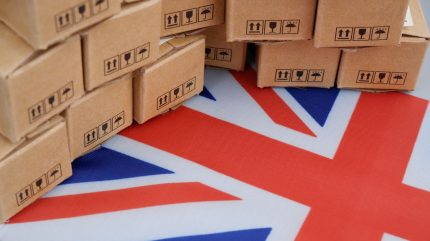
UK food and drink exports rose in value in the first quarter but volumes were flat amid a “continued struggle” to return to pre-pandemic levels.
That was the view of the UK’s Food and Drink Federation (FDF) as the industry trade body revealed shipments of food and beverages climbed 6.3% to £6bn ($8.1bn) in the opening three months of the year.

Discover B2B Marketing That Performs
Combine business intelligence and editorial excellence to reach engaged professionals across 36 leading media platforms.
However, with volumes relatively flat from the year-earlier quarter, the FDF highlighted in its latest Trade Snapshot report that food exports from the UK are 20.4% lower than they were in 2020, while non-alcoholic beverages are down 9.2%.
“Significant growth is needed to return to pre-pandemic levels” in the long term, the FDF said.
Export volumes to the EU, the UK’s largest trade partner, declined by 3.7% for food and 1.7% for non-alcoholic drinks compared to the first quarter of 2024.
An agreement between the UK and EU in May to simplify sanitary and phytosanitary (SPS) controls – yet to be rubber stamped and finalised – could increase UK exports to the bloc by 22.5%, though not until 2027 at the earliest, the industry body said.

US Tariffs are shifting - will you react or anticipate?
Don’t let policy changes catch you off guard. Stay proactive with real-time data and expert analysis.
By GlobalDataBalwinder Dhoot, the director of industry growth and sustainability at the FDF, said the SPS talks are a “positive step towards reversing a concerning decline in exports from the UK” but added that a deal is “far from a silver bullet”.
“It is vital that through these negotiations the UK secures the ability to influence EU regulatory decisions that will impact British businesses,” Dhoot said.
Away from the EU, the FDF highlighted the potential “positive impact” for the UK’s food and drink producers from recent trade deals with India and the US.
The value of UK food and beverages exports to non-EU countries rose by 10.5% in the first three months of 2025 as “food producers take advantage of improved access to growing global markets”, according to the FDF.
For instance, the FDF said that since the Comprehensive and Progressive Agreement for Trans-Pacific Partnership (CPTPP) came into effect in December, UK exports of soft drinks to Malaysia have increased by 103% and sweets by 48%.
Meanwhile, the trade body said the free-trade agreement with India is likely to benefit UK exporters of soft drinks, biscuits and chocolate in particular.
“While there are encouraging signs of an improved global trade outlook ahead, FDF warns that there’s more work to be done. It’s vital that government continues to build closer trade relationships with trade partners, near and far, and prioritises British competitiveness in ongoing negotiations,” it said.
UK food and drinks exports to the US increased 23.4% in the first quarter, which the FDF said was probably in anticipation of US tariffs, before an agreement was struck between the two governments in May.
However, the FDF added that negotiating the removal of the new 10% tariff should be a priority.
Dhoot added: “This new data demonstrates that there are also plenty of opportunities for UK food and drink beyond the EU, meaning government should keep its foot on the gas when it comes to improving the UK’s trade relationships across other global markets.
“Removing trade barriers and helping more businesses expand into new markets abroad presents a crucial growth opportunity, while diversifying our import markets is vital to protecting the UK’s food security.”





